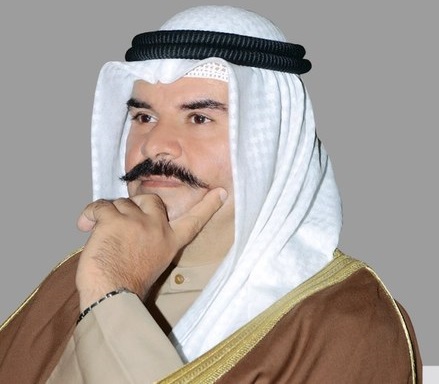
Sheikh Fahad Salem Al-Ali Al-Sabah studied history at the University of Kuwait. He was captured (arrested) in November 14, 1990 for his resistance to the Iraqi occupation. He was released on April 6, 1991.
He held various positions including:
• Member of the Board of Directors and the Chairman of the Employment Committee on the Commercial Bank Of Kuwait, Kuwait's second largest bank, and oversaw the reactivation of the bank’s branches after Iraq's invasion of Kuwait from 1990 to 1992.
• held several positions in the Kuwaiti National Guard and became Assistant Deputy Minister for Information systems and services in 1993-2001.
• took over the presidency of the Board of Directors, then became Director General of the Public Authority for Agriculture Affairs and Fish Resources, of a rank of minister in 2001-2006.
• represented the State of Kuwait at the Arab and international level in many agricultural conferences and official visits, and has many media projects.
• author and researcher in the field of civilizations and (Islamic civilization) in particular published a book titled "Fahad Al Salem Center for Dialogue of Civilizations and freedom defense", translated into three languages.
This book was written by Sheikh Fahad Salem Al-Ali Al-Sabah, stemming from his eagerness to show the facts related to intellectual and social issues. The need for such a book is because it clarifies many controversial issues, which are usually addressed without any clarification. This book puts such ideas and issues within reach of work and practice, after clearly defining them away from individualism and subjectivity.
The research and studies were initiated on the basis that dialogue is the only way to reach the shores of knowledge, taking objectivity as a base for style for debate, assisted by a comprehensive knowledge of schools, as well as clear vision and noble targets.
So it was not difficult for him to choose the themes discussed in the book, and clarify any confusion in the ideas, starting from freedom as a priority.
Sheikh Fahad first elaborated on the concept of freedom, considering it equal to commitment and synonymous with responsibility.
The book also tackles democracy, as a concept that became so popular and gained much importance as the ultimate alternative to the governing regimes in all countries of the world, after being adopted by the Western world, calling for elections to determine representatives of the people and therefore the rulers.
But the adoption of such regime can only be the least worst, because elections make the well-informed and ignorant equal.
Justice is one of the first humanitarian objectives in terms of its importance, as it guarantees social peace and plays a major role in defending the weak and the oppressed.
This is why the book gives a great share to the concept of justice, shedding the light on its definition and aspects, starting from the keenness of Islam on devoting justice and establishing the proper relationship between all members of society. Human justice is often incomplete as the laws are always issued by the powerful to rule the weak.
Sheikh Fahad continues in his views on Islam and intellectual tendencies to tackle an issue that has always been a point of controversy among opinion makers and researches, as he sheds the light on Islam's view on philosophy, explaining the importance given by religion to logic and discussion, and the freedom of thought beyond any border. However, Islam says that the human mind cannot grasp the depth of the great facts about the universe and creation.
In order to defend Islam, the writer was generous in providing proofs and evidence to invalidate the unjust charges and fabrications.
It is interesting that colonialism's hostility to Islam has taken a new form, so that the war on religion reached to war on Prophet Muhammad (SAW) as the ignorant and Zionists disrespected him, and sabotaged his image, in order to ignite racism as a prelude to fight Islam.
Globalization has become a weapon to eliminate the peculiarities of the peoples, and destroy its legacy of morals, in preparation for the invasion of the west.
Author and researcher Sheikh Fahad Salem Al-Ali Al-Sabah says in his book "Fahad Al Salem Center and the dialogue of civilizations", which addresses hostility to Islam since its inception: "since the beginning of Prophet Muhammad's message, at the earliest age, when the number of Muslims did not exceed the fingers of one hand, the polytheists started to plot their vicious schemes and evil plans.
In conclusion:
"Fahad Al Salem Center and the dialogue of civilizations" answers the pressing questions in this unstable stage, and shows the point of view of Islam, which represents moderation, in the light of extreme theories that ignite disputes without contributing to the unity of Muslims, which we desperately need.
To download the book: Click Here
• Sheikh Fahad also wrote a book talking about his timer in Iraq's prisons after he was arrested during the invasion, as well as other works to be published.